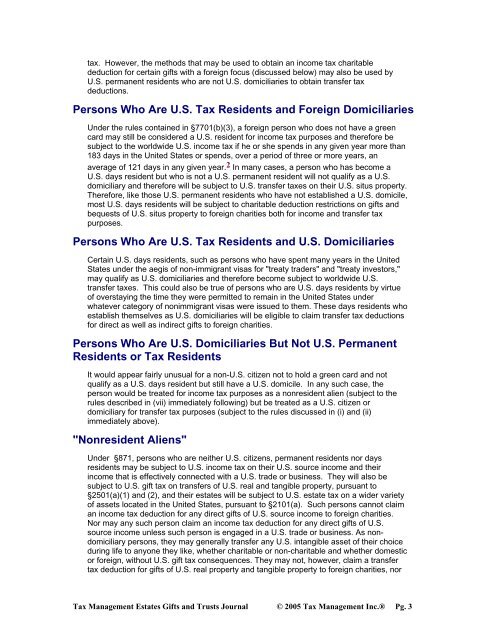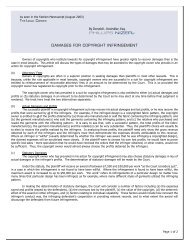International Charitable Giving And Planning ... - Phillips Nizer LLP
International Charitable Giving And Planning ... - Phillips Nizer LLP
International Charitable Giving And Planning ... - Phillips Nizer LLP
You also want an ePaper? Increase the reach of your titles
YUMPU automatically turns print PDFs into web optimized ePapers that Google loves.
tax. However, the methods that may be used to obtain an income tax charitablededuction for certain gifts with a foreign focus (discussed below) may also be used byU.S. permanent residents who are not U.S. domiciliaries to obtain transfer taxdeductions.Persons Who Are U.S. Tax Residents and Foreign DomiciliariesUnder the rules contained in §7701(b)(3), a foreign person who does not have a greencard may still be considered a U.S. resident for income tax purposes and therefore besubject to the worldwide U.S. income tax if he or she spends in any given year more than183 days in the United States or spends, over a period of three or more years, anaverage of 121 days in any given year. 2 In many cases, a person who has become aU.S. days resident but who is not a U.S. permanent resident will not qualify as a U.S.domiciliary and therefore will be subject to U.S. transfer taxes on their U.S. situs property.Therefore, like those U.S. permanent residents who have not established a U.S. domicile,most U.S. days residents will be subject to charitable deduction restrictions on gifts andbequests of U.S. situs property to foreign charities both for income and transfer taxpurposes.Persons Who Are U.S. Tax Residents and U.S. DomiciliariesCertain U.S. days residents, such as persons who have spent many years in the UnitedStates under the aegis of non-immigrant visas for "treaty traders" and "treaty investors,"may qualify as U.S. domiciliaries and therefore become subject to worldwide U.S.transfer taxes. This could also be true of persons who are U.S. days residents by virtueof overstaying the time they were permitted to remain in the United States underwhatever category of nonimmigrant visas were issued to them. These days residents whoestablish themselves as U.S. domiciliaries will be eligible to claim transfer tax deductionsfor direct as well as indirect gifts to foreign charities.Persons Who Are U.S. Domiciliaries But Not U.S. PermanentResidents or Tax ResidentsIt would appear fairly unusual for a non-U.S. citizen not to hold a green card and notqualify as a U.S. days resident but still have a U.S. domicile. In any such case, theperson would be treated for income tax purposes as a nonresident alien (subject to therules described in (vii) immediately following) but be treated as a U.S. citizen ordomiciliary for transfer tax purposes (subject to the rules discussed in (i) and (ii)immediately above)."Nonresident Aliens"Under §871, persons who are neither U.S. citizens, permanent residents nor daysresidents may be subject to U.S. income tax on their U.S. source income and theirincome that is effectively connected with a U.S. trade or business. They will also besubject to U.S. gift tax on transfers of U.S. real and tangible property, pursuant to§2501(a)(1) and (2), and their estates will be subject to U.S. estate tax on a wider varietyof assets located in the United States, pursuant to §2101(a). Such persons cannot claiman income tax deduction for any direct gifts of U.S. source income to foreign charities.Nor may any such person claim an income tax deduction for any direct gifts of U.S.source income unless such person is engaged in a U.S. trade or business. As nondomiciliarypersons, they may generally transfer any U.S. intangible asset of their choiceduring life to anyone they like, whether charitable or non-charitable and whether domesticor foreign, without U.S. gift tax consequences. They may not, however, claim a transfertax deduction for gifts of U.S. real property and tangible property to foreign charities, norTax Management Estates Gifts and Trusts Journal © 2005 Tax Management Inc.® Pg. 3




